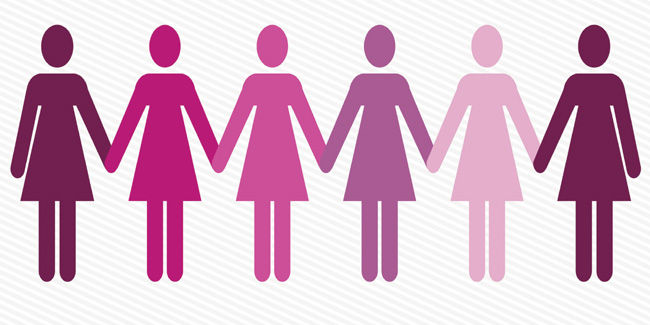The world is about to turn pink.
No, I am not referring to some alternate universe where we have a partially Republican government – I mean PINK, Breast Cancer Awareness Pink. Susan G. Komen, the American Cancer Society and the National Breast Cancer Foundation are all going to be help make the world pink starting this Saturday.
Pink Ribbons. Pink Toilet Paper. Pink Campbell’s soup cans. Pink gloves on the Delta Airlines ground crew in every airport in America. If you can make it pink, it will be pink starting October 1.
It’s Breast Cancer Awareness month and the forces behind turning the world pink are hoping that the more pink you see the more aware you’ll be about the single greatest health danger facing women in the world – cancer. This is driven by an industry that is actively working hard to keep women in fear of the dreaded breast cancer, and keep the funds flowing to support their charities.
Many of these charities do phenomenal work and the rate of breast cancer related deaths is definitely down as a result of the awareness of the disease. But not across the board. There is a population that has not been greatly helped by all the awareness efforts.
And it’s not men – who do in fact get breast cancer as well as women, not in large numbers though, and certainly none of the pink platoon really wants to address that issue. The women who are not helped by the awareness campaigns, are the women who have dense breasts.
Turns out the conventional wisdom of a woman getting a mammogram to find cancerous tumors is right, but only for those women who have fatty breasts. Mammograms are able to “see” through the fat and identify those tumors that may be cause for concern, but a mammogram cannot distinguish effectively when a breast is made of dense fibrous tissue.
I learned about this when a college friend was mentioned in our alumni newsletter for her award winning documentary called “HappyGram”. It is an in-depth look at the medical aspects of breast cancer and how it failed one of our fellow alums – Hallie Leighton. She had a family history of breast cancer, her mother had died of it and she was determined to do all she could to avoid the same fate. She started going for mammograms earlier than most, and each year she received a letter saying her results were normal.
Here’s the thing about that letter – normal doesn’t actually mean cancer free. It just means the radiologist who reviewed the mammogram didn’t see anything that looked like cancer. Hence the title ‘HappyGram’. Hallie had dense breasts though, and no one told her that the density could obscure tumors and skew the results of her mammogram.
The lack of knowledge, and the annual letter saying her results were “normal” led her into a false sense of security. Sadly by the time the cancer had spread enough to be recognizable, it had also metastasized and she was on a fatal trajectory.
In the documentary HappyGram (www.happygramthemovie.com) Director Julie Marron goes into an in-depth analysis of the forces at play when it comes to women’s health and breast cancer. The movie addresses the various industry constituents like the American College of Radiology and their positions on the necessity and propriety of informing patients of the fact that they have dense breasts (they’re against it in the movie but seem to have softened on that position since).
The breast cancer “industry” was quite vocally against letting patients know about the fact of their dense breasts, and actively worked to prevent legislation that would require the radiologist from informing patients of their status. “Even suggesting that mammography has limitations makes it appear you are against women” said Dr. Deborah Rhodes M.D. (Mayo Clinic) in the documentary.
Luckily in 2012 California passed a law authored by then state Senator Joe Simitian, that a patient is to be informed, although it took an extra year and had to overcome Governor Brown’s initial veto in the previous session.
The number of women effected is tremendous. Annually 38 million women get mammograms, approximately 15 million of them have dense breast tissue and could be living with a false sense of security. If you have dense breast tissue, there are better options to scan for cancerous tumors, there’s ultrasound, MBI (molecular breast imaging) and MRI.
As the world goes pink in a week, we should be more aware of the disease, but we should also be more skeptical of those who claim to be fighting the good fight. As the movie Ribbons, Inc. showed, all is not as it seems in the charitable world of breast cancer fundraising.
Like the dense breasts themselves, the industry itself obscures the issues and hides behind a wall of fear, so that the fundraising and medical costs never end. The movie Happygram helps to dispel the myth that a “normal” mammogram means an ‘all-clear’ to the patient. By doing so they are helping save lives, just like the many good charities and dedicated medical professionals.
It’s just a damn shame it came too late for my friend Hallie Leighton. Her participation in this movie will hopefully save others from the fate which she, like a classic Greek Drama, was destined to suffer.
David Pisarra is a Los Angeles Divorce and Child Custody Lawyer specializing in Father’s and Men’s Rights with the Santa Monica firm of Pisarra & Grist. He welcomes your questions and comments. He can be reached at dpisarra@pisarra.com or 310/664-9969.You can follow him on Twitter @davidpisarra








